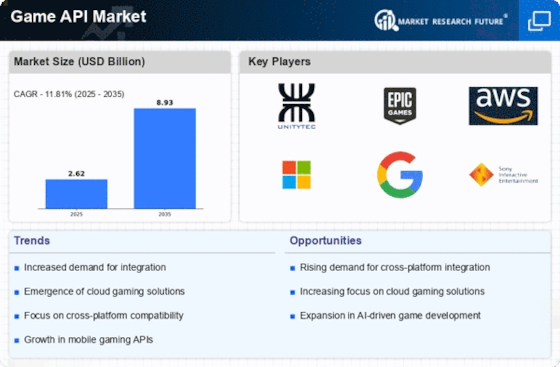Top Industry Leaders in the Game API Market
Competitive Landscape of the Game API Market
The game API market, a vital cog in the ever-evolving gaming ecosystem, is experiencing explosive growth. APIs, or application programming interfaces, enable seamless integration of functionalities and services within and between games, fostering innovation and enriching player experiences. This dynamic landscape is characterized by established industry giants, nimble startups, and evolving market dynamics, making it crucial for stakeholders to understand the competitive terrain.
Key Players:
- NetEnt (Sweden)
- Cake Network (Netherland)
- Neteller (England)
- Matrix Games (England)
- Microsoft Corporation (U.S.)
- Google (U.S.)
- Apigee Corp. (U.S.)
- Amazon.Com, Inc. (U.S.)
- CA Technologies (U.S.)
- Tibco Software Inc. (U.S.)
- Others
Strategies Adopted:
- Openness and Interoperability: Open APIs with clear documentation and readily available SDKs are gaining favor, fostering broader adoption and enabling seamless integration with diverse game engines and platforms.
- Subscription and Freemium Models: A mix of subscription models with tiered functionalities and freemium offerings with limited features cater to diverse developer budgets and project requirements.
- Focus on Innovation: Leading players prioritize continuous innovation, expanding API functionalities to encompass areas like AI integration, live operations, and blockchain technology.
- Strategic Partnerships: Collaborations with game publishers, development studios, and technology providers allow API companies to reach wider audiences and offer more comprehensive solutions.
Factors for Market Share Analysis:
- API Breadth and Depth: The range of functionalities offered, the level of granularity, and the degree of customization available play a crucial role in attracting developers.
- Developer Experience: Ease of integration, comprehensive documentation, and robust support infrastructure are key factors influencing developer adoption.
- Pricing and Licensing: Competitive pricing models, flexible licensing options, and transparent billing practices are essential for attracting and retaining customers.
- Technology Stack: Compatibility with popular game engines and platforms, integration with existing development workflows, and robust security measures are crucial considerations.
Emerging Companies and Trends:
- Hypercasual and Mobile Focus: APIs catering to the rapidly growing hypercasual and mobile gaming segments are gaining traction, offering solutions for monetization, user engagement, and live operations tailored to these specific markets.
- Blockchain and Metaverse Integration: APIs facilitating the integration of blockchain technology and metaverse-related functionalities are attracting developers looking to build innovative and immersive gaming experiences.
- Rise of Low-Code/No-Code Solutions: APIs that enable non-programmers to easily integrate functionalities into their games are gaining traction, democratizing game development and expanding the potential player base.
Current Investment Trends:
- Venture Capital: VC firms are actively investing in promising startups developing innovative game APIs, fueling the growth of the market.
- Strategic Acquisitions: Established players are acquiring smaller companies with niche expertise to bolster their offerings and fill strategic gaps in their portfolios.
- Focus on Open Source: Open-source APIs and community-driven development are gaining traction, fostering collaboration and innovation within the game development ecosystem.
Latest Company Updates:
Version 1.2 of Microsoft's DirectStorage SDK was released in 2023, and it includes a surprising update that will speed up ageing hard drives. Although the original purpose of DirectStorage was to transfer data from the newest, fast NVMe solid state drives to your GPU without the CPU interfering, Microsoft has received feedback from developers indicating that enhanced compatibility for older hard drives will also help games. While some aspects of DirectStorage have always functioned on hard drives, developers have been forced to employ different techniques for HDDs and NVMe devices. This makes it more difficult to support an API that was primarily made for fast SSDs, which PC gamers don't always utilise to store and run games.










